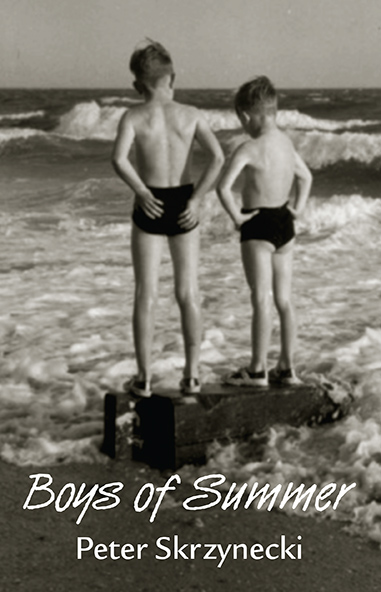
No of Pages: 224
RRP: 26.95
ISBN Print: 978-1-921556-05-0
Boys of Summer
Boys of Summer is set in the 1950s when American film stars and teenage rock’n’roll idols were beginning to influence Australian culture. It is a coming-of-age account of Tom Krupa’s childhood in Sydney’s outer western suburbs with his Polish migrant parents. His is a world of backyard adventures, radio serials and comic-book heroes.
Tom is the eye-witness to two seminal incidents, the implications of which reverberate through the novel. Neither is quite as it appears and Tom is confronted with terrors that lie in wait beyond the community and others that lurk within.
What readers say
“The novel is about family and community and the power of memory and, more importantly, how people find peace with the past. When you read ‘Boys of Summer’, you’ll feel as if you’ve met all these people at some time in your life. Not just the Krupa family, but those neighbourhood kids who found such joy in playing outside and creating their own fun. Or those wild tragic girls like Rhonda who fascinated us all whether we were male or female. Or those grief-stricken families dealing with death—and, sadly, many of us have met those who have come into our homes and been given so much trust and had that trust violated.
For me, Boys of Summer isn’t about changing events in our past, but changing the way we deal with them, and I think that can be said about much of Peter’s work. There’s never a sense of victim or pointing blame. It’s sometimes about frustration and helplessness, but there’s always a sense of “Where do we go from this point? How do we move on?” And for those of us who have found such solace in books and reading, it’s no surprise that young Tom is pulled out of grief by the power of story, of words.” Melina Marchetta, author of ‘Looking for Alibrandi’ and ‘The Piper’s Son’
“Boys of Summer seems to promise an idyllic remembrance of youth and innocence, “drowsy noons and evenings steeped in honeyed indolence”. Yet the book’s epigraph, from Dylan Thomas rather than Keats, puts that title in disquieting context: “I see the boys of summer in their ruin/Lay the gold tithings barren.”
Skrzynecki will write of what on the one hand is a golden age of innocence. In adult life, his protagonist Tom Krupa (born in Germany just after the Second World War, as was Skrzynecki) will reflect that “these days will be among the best of his life”. Yet they would be too soon despoiled, through a shocking but familiar agency, as the novel relates.” Peter Pierce, The Canberra Times, 10 April 2010
“The book feels hand-knitted, beginning with the poetically tight sequence that shapes and supports the main body of the story. Centimetre by centimetre and stitch by stitch, the novel approaches its conclusion. This is what you call telling a story: Skrzynecki’s words moving through his fingers like beads, and the slowness of the narrative disguising and heightening the final, dreadful climax as the pattern emerges, the serpent strikes. I see the boys of summer in their ruin/Lay the gold tidings barren. And finally, sickeningly, it all makes sense.” Kathy Hunt, The Weekend Australian, 24-25 April 2010
About the Author
Peter Skrzynecki was born in 1945 in Germany and came to Australia in 1949. He has published eighteen books of poetry and prose including Boys of Summer (Brandl & Schlesinger, 2010) and won several literary prizes, including the Grace Leven Prize and the Henry Lawson Short Story Award. His book of poems, Immigrant Chronicle, has been a set text on the New South Wales HSC English syllabus for many years. In 1989 he was awarded the Order of Cultural Merit by the Polish government, and in 2002 he received the Medal of the Order of Australia (OAM) for his contribution to multicultural literature. His memoir, The Sparrow Garden, was shortlisted for the National Biography Award. He is an adjunct associate professor in the School of Humanities and Languages at the University of Western Sydney.
Read More